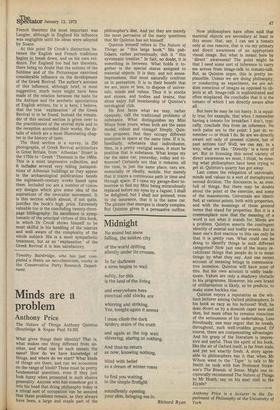Minds are a problem
Anthony Price
The Nature of Things Anthony Quinton (Routledge & Kegan Paul E4.50) What gives things their identity? That is, what makes one thing different from another, and what can let each remain the same? How do we have knowledge of things, and where do we start? What kinds of things are there, and can we economise on the range of kinds? These must be pretty fundamental questions, even if they just look fuzzy when presented in such elusive generality. Anyone who has somehow got it into his head that doing philosophy today is a trivial sort of occupation can be assured that these problems remain, as they always have been, a large and staple part of the philosopher's diet. And yet they are merely the most pervasive of the many questions that Mr Quinton has set himself.
Quinton himself refers to The Nature of Things as "this large book." His publishers, rather portentously, dub it " this systematic treatise." In fact, no doubt, it is something in between. What holds it together is the special status assigned to material objects. It is they, and not senseimpressions, that most naturally confront us in perception. It is to their benefit that we are, more or less, to dispose of universals, minds and values. Thus it is stocks and stones, and bodies and brains, that alone enjoy full membership of Quinton's ontological club.
He first faces what we may, rather opaquely, call the traditional problems of substance. What distinguishes my Mini Minor from yours, when both are the same model, colour and vintage? Simply, Quinton proposes, that they occupy different positions in space at the same time. If it is, familiarly, substance that individuates, then, in a pretty vestigial sense, it must be position that is substance. What keeps my car the same car, yesterday, today and tomorrow? Certainly not that it remains, all the time, in just the same place; cars are, essentially or ideally, mobile. Nor merely that it traces a continuous path in time and through space. If I open my garage-door tomorrow to find my Mini being miraculously replaced before my eyes by a Jaguar, I shall be delighted, but I shall not pretend, even to the insurance, that it is the same car. The picture that emerges is clearly complex. But Quinton gives it a persuasive outline. Now philosophers have often said that material objects are secondary at least in this sense: that, say, I can see a tomato only at one remove, that is via my primary and direct awareness of an appropriate visual image. But what is meant here by ' direct ' awareness? The point might be that I need some sort of inference to carry me across from image-talk to tomato-talk.
But, as Quinton urges, this is pretty implausible. Unless we are doing philosophy, or conducting an experiment, we are sel dom conscious of images as opposed to objects at all. Image-talk is sophisticated and often misplaced. He concludes that it is the tomato of which I am directly aware after all.
But here he may be too hasty. It is equally true, for example, that when I remember having a tomato for breakfast I don't, typically, conclude this from an inference. No such pains are to the point: I just do remember — or think I do. So are we directly aware not only of present objects, but of past actions too? Well, we can say, in a way, what we like. ' Directly ' is a term of art. But in licensing this novel variety of direct awareness we must, I think, be missing what philosophers have been trying to get at. Quinton's quarry has got away.
Last comes the relegation of universals, minds and values to a sort of metaphysical second division. The discussion is, as ever, full of things. But there may be doubts about the point of the exercise, and some of the manoeuvres. Universals are identified, at various points, both with properties, and with the meanings of those general terms that stand for properties. But it is a commonplace now that the meaning of a word is not what it stands for. Minds are a problem. Quinton asserts the contingent identity of mental and bodily events. But at least one's first reaction to this can only be that it is pretty rum. What could one be doing to identify things in such different categories? Nov just one of the many recalcitrant things that people do is to mean things by what they say. And one recent account of meaning brings in communicative intention. Quinton will have none of this. But his own account is oddly inadequate. Values are only a shadowy obstacle to his programme. However, his own brand of utilitarianism is likely, as he predicts, to make some hackles rise.
Quinton enjoys a reputation as the wittiest lecturer among Oxford philosophers. Is his book as racy as his lectures? Well, he does divert us by a donnish caper now and then, but more often he remains conscious of the seriousness of his undertaking. Less frivolously, one may regret that he treads, throughout, such well-trodden ground. Of course, there are compensating advantages. And his grasp of the literature is impressive and useful. Thus the spirit of his book, like the air of Oxford itself, is far from stale, and yet not exactly fresh. A story agree able to philosophers has it that when Mr Wilson went to the ' Tiger ' to talk to Mr Smith he took with him Professor Strawson's The Bounds of Sense. Might one re ciprocally recommend The Nature of Things to Mr Heath, say on his next visit to the Elysee?
Anthony Price is a lecturer in the Department of Philosophy at the University of York


































 Previous page
Previous page